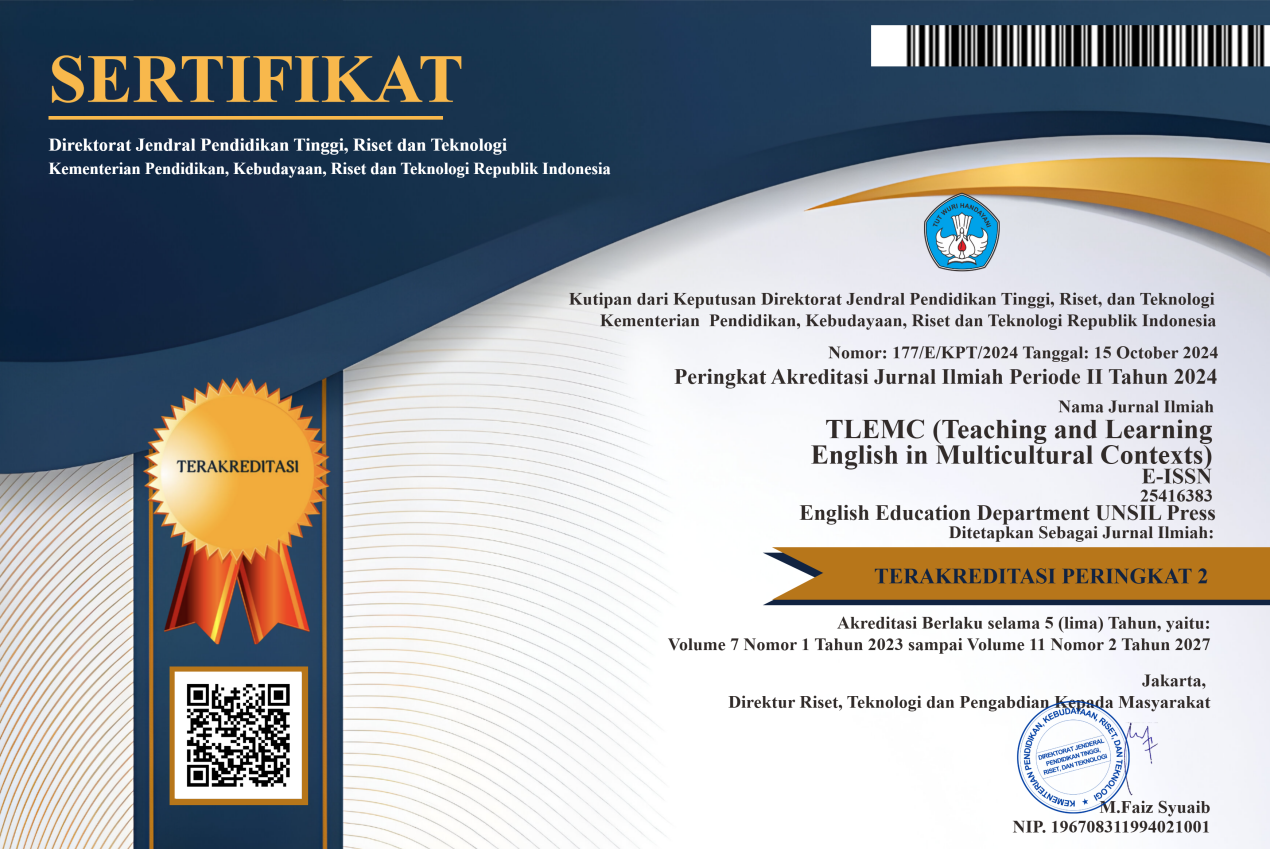Examining the Students’ Vocabularies Improvement by Using Scramble Card
Abstract
This research is aimed at whether using scramble cards improves the students’ vocabulary. It is also aimed at the enrichment of the students’ achievement in teaching learning process using scramble cards. The materials used in this research were scramble cards. Some steps in this research start from identifying the problems, planning the action, implementing the action, observing or monitoring the action, reflecting the result of the observation, and research findings. The research was conducted in four meetings. A meeting for pre-test, 2 meetings for treatments and a meeting for post-test. The sample of this research was 35 first-year students of a polytechnic in Indonesia. The technique in collecting the data was quantitative method. In the quantitative method, the researcher used tests to examine the students’ achievement. The test consisted of the pre-test and post-test. The technique to analyze the test result was by comparing the mean score of pre-test and post-test. Besides that, this research also used descriptive statistics and the t-test of non-independent. The research result shows that scramble card can enhance the students’ vocabulary mastery, it can be seen from the aspect of the vocabulary mastery, such as the students could understand, grasp, remember, pronounce, write about 80 until 90 % of the words correctly and use the words in some sentences appropriately. Second, the improvement also can be seen from the pre-test and post-test of the students’ score. The mean score of the pre-test improves from 5.67 to 8.85 in post-test. Then, the scores of the pre-test and post-test show that there is also an improvement in students who achieve the minimum standard score, that is 60. They are from 3.2% to 100% of students. As the conclusion of this research that the use of scramble cards improves students’ vocabulary mastery.
Keywords: vocabulary, scramble card, classroom action-research, improvement
Full Text:
PDFReferences
Al-Shawi, M. A. (2014). Using Game Strategy for Motivating Students to Learn New English Vocabulary. doi: 10.12816/0015403
Arikunto, S. (2014). Prosedur Penelitian Suatu Pendekatan Praktek. Jakarta: Rineka Cipta.
Burns, A. (1999). Collaborative action research for English language teachers. Cambridge University Press.
Cameron, L. (2011). Teaching Languages to Young Learners. United Kingdom: Cambridge University Press.
Coady, J., & Huckin, T. (1997). Second language vocabulary acquisition: A rationale for pedagogy. Cambridge University Press.
Coulson, J., Carr, C. T., Hutchinson, I., Eagle D. (2017). The New Oxford Encyclopedic Dictionary. Singapore: Toppan Printing Company.
Dewi, N. S., & Kurniawan, A. (2017). The effect of scramble game towards the ability of composing sentences for students with intellectual disability. Journal of ICSAR, 1(1), 81–84.
Dita, A., & Zaki, L. B. (2023). The Effects of Scramble Game in Improving Students Vocabulary at Secondary Students of Muhammadiyah Plus Batam. International Social Sciences and Humanities, 2(1), 262-267.
Hopkins, D. (2010). A Teacher’s Guide to Classroom Research. USA: University of Michigan.
Lackey, G. D. (1996). U.S. Patent No. 5,586,765. Washington, DC: U.S. Patent and Trademark Office.
Kemmis, S. & McTaggart, R. (2014). The Action Research Planner. Victoria: Deakin University.
Lim, C., Riyanti, D., & Wardah, W. (2022). Designing POCAB Using Powerpoint as a Medium for Teaching Adjectives to the 7th Grade Students. TLEMC (Teaching and Learning English in Multicultural Contexts), 6(2), 107-114.
McKay, P. (2006). Assessing Young Language Learners. United Kingdom: Cambridge University Press
Nur, H. (2016). Improving Students’ Vocabulary Achievement through Word Game. doi: 10.21070/JEES.V1I2.446
Palupi, R. E. A. (2016). Enriching Vocabulary Mastery Using Short Stories (A Classroom Action Research in the Second Year of SMP N 5 Sukoharjo in the Academic Year of 2009/2010). Jurnal Dimensi Pendidikan dan Pembelajaran, 3(1), 34-44.
Petty, W. T and Jensen, J. M. (1980). Developing Children’s Language. Boston Massachusetts: Allyn and Bacon, Inc.
Rasuan, Z. B. (2017). Teaching vocabulary mastery by using systeamtic game. Tarbawy, 4(2), 196-212. doi: 10.32923/TARBAWY.V4I2.818
Saiya, T. M., Oroh, E. Z. ., & Sanger, M. . (2023). Enriching Students’ Vocabulary through Spelling Bee Game. SoCul: International Journal of Research in Social Cultural Issues, 2(4), 662-667. Retrieved from https://ejurnal.unima.ac.id/index.php/socul/article/view/7207
Sakinah, V. (2022). The Use of Scrambled Word Game on Students Vocabulary. Journal of English Teaching and Linguistics Studies (JET Li), 4(1), 41-45. doi: 10.55215/jetli.v4i1.5149
Ur, P. (1998). A Course in Language Teaching. Cambridge: Cambridge University Press
Wiersma, W. (2010). Research Method in Education. USA: A Person Education Company.
https://www.teacherspayteachers.com/browse?search=sentence%20scramble%20cards
DOI: https://doi.org/10.37058/tlemc.v8i1.11427
Refbacks
- There are currently no refbacks.
INDEXED BY:
This work is licensed under a Creative Commons Attribution-NonCommercial-ShareAlike 4.0 International License.
![]()
TLEMC (Teaching and Learning English in Multicultural Contexts)
Program Studi Pendidikan Bahasa Inggris
Fakultas Keguruan dan Ilmu Pendidikan
Universitas Siliwangi
Jl. Siliwangi No. 24 Kota Tasikmalaya - 46115
email: tlemc@unsil.ac.id





